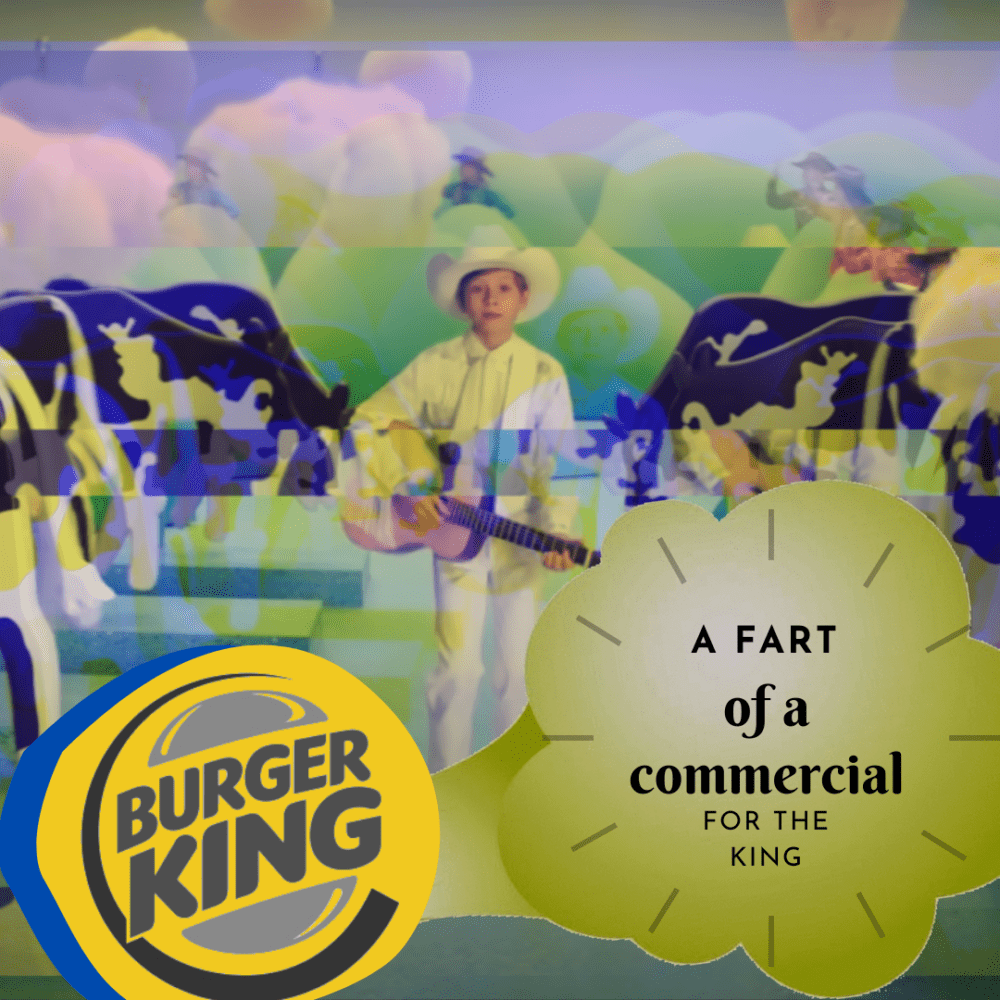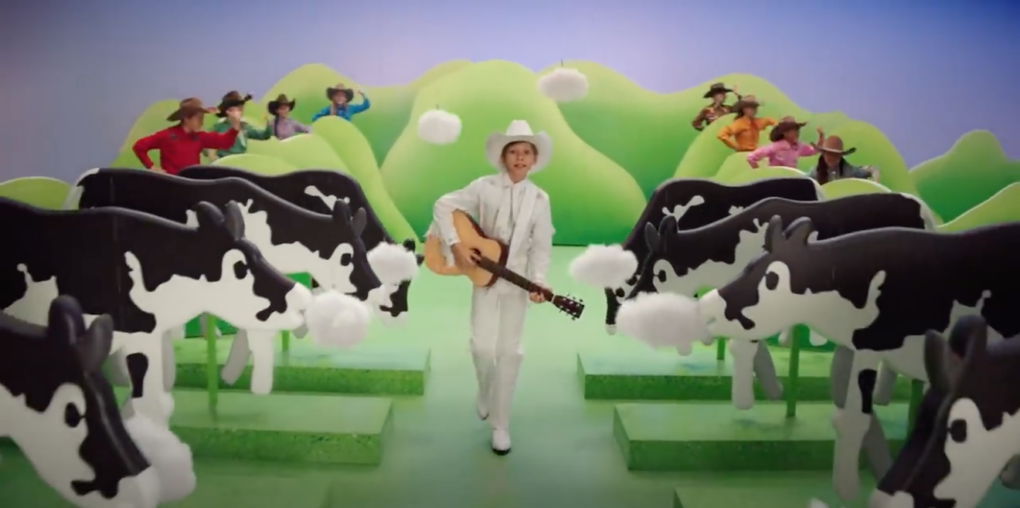You’ve probably seen Burger King’s latest marketing video featuring Wal-Mart yodeler Mason Ramsey singing about methane emissions from cow farts and burps. The ad promotes Burger King’s “Cows Menu” consisting of beef from cows fed lemon-grass leaves, which some research suggests decreases methane emissions. I must admit, the song is catchy, the cartoonish set design is clever, and the goal of promoting environmental sustainability in the beef sector is commendable. Yet, the video received significant backlash from farmers and members of the agriculture industry.
One Step Back
The agriculture industry raised a number of issues with the video. However, the lack of concrete evidence to back up Burger King’s claims was the most concerning. Burger King cites research from the Universidad Nacional Autónoma de México which indicates that feeding cows 100g of lemon-grass leaves per day will reduce methane emissions by 33% over the period the diet is fed. However, this research has not yet been peer-reviewed nor published. Furthermore, a similar study lead by Dr. Ermias Kebreab from the University of California, Davis, found inconclusive preliminary results
A number of other studies have looked at alternative cattle feed additives to reduce methane emissions as well. For example, Dr. Ermias Kebreab has seen encouraging results from his experiments of adding seaweed to cattle feed. Dr. Karen Beauchemin, a livestock specialist with Agriculture and Agri-Food Canada, has seen promising emission reductions from increasing dietary fat with crushed oilseeds, and by adding commercial active dried yeast products to feed. Here at the U of S, researchers have seen preliminary emission reductions from cattle feeding on ‘non-bloat legumes’. Yet, although the addition of these various feed additives may help create a sustainable nutrition plan for cows, the research is unable to confirm this as of yet.
Another element of the video that raised red flags for farmers and scientists alike was the focus on cow farts. As tweeted by Dr. Frank Mitloehner from UC Davis: “ITS. NOT. THE. COW. FARTS.” In reality, only 5-10% of methane emissions come from cow manure and flatulence. The remaining 90-95% are released from cows’ mouths. The methane released through cow burps is a by-product of enteric fermentation, a digestive process in which sugars are converted into simpler molecules.
Other concerns focused on the portrayal of the agriculture industry and beef farmers individually. Images of children wearing gas masks and melting polar ice caps depict the industry as damaging to the environment and contributing quite substantially to global-warming. We know that agriculture is a contributor to GHG emissions, yet, in both Canada and the U.S., agriculture accounts for only about 10% of total emissions, of which roughly 44% is methane from livestock. Additionally, the inclusion of a brief scene featuring a foolish, flatulent old farmer plays into old stereotypes the industry has been working for years to overcome. Overall, the video did not paint a pretty (or accurate) picture of agriculture or the hard-working farmers themselves.
Two Steps Forward
Fortunately, the outcry from the agriculture industry in response to the video led to the start of some relationship-building conversations with Burger King. The Farm Babe (a.k.a. Michelle Miller) had a Zoom call with BK’s Chief Marketing Official Fernando Machado to discuss why members of the industry were unhappy with the video. Miller explained to Machado the importance of showcasing the positive undertakings of the beef industry by saying: “Lift us up, don’t tear us down. Without farmers, Burger King has no beef at all.” She reports that Machado was apologetic and claimed to learn a lot from the conversation. Burger King even agreed to visit the Farm Babe’s Iowa ranch to learn more about the people and farms behind the beef.
Members of BK’s team also contacted Dr. Frank Mitloehner, UC Davis, to learn why he was upset with the video. Mitloehner said he educated the team on the facts about methane emissions from beef production, leading to the removal of some content, including the scene featuring the foolish old farmer, and pulling the ad from all TV stations. Burger King also asked him to work with them moving forward by cooperating with their research, as well as reviewing media content before it reaches the public.
These open and honest communications between the fast-food giant and credible representatives of the agriculture industry are progress. Though Burger King is yet to make an official statement, alongside the resulting modification of the video and the promise of future cooperation, this fumble in marketing has turned into a success story for agricultural communication.
What About Other Food Chains?
While Burger King has listened to the voices of opposition to their campaign, not all chains have done the same. One of Canada’s fast food chains, A&W, launched their “Better Beef” campaign in 2013. This campaign marketed beef products with no added hormones or steroids as better than conventional production, which was not proven. Beef producers backlashed and boycotted the chain, but A&W continues to market on this premise (though they did change the phrasing to “Raised Without” due to producer feedback). Although A&W says they would prefer to source all Canadian beef, they have not yet been able to convince Canadian ranchers to produce enough beef which meets their specifications. However, the company’s recent announcement that they are working towards serving 100% Canadian beef suggests better cooperation with the Canadian beef industry may be coming.
In 2016, Earl’s restaurant also headed down this similar path of marketing certified humane beef, which meant sourcing beef from the U.S., only to back-peddle when the Canadian beef industry and supporters voiced their concerns. Only a few months after their decision to source U.S. beef, Earl’s president apologized to Canadian farmers for not consulting with them and for even suggesting that their production is inhumane. Earl’s quickly switched back to Canadian beef sources.
On the other hand, McDonald’s made the commitment in 2003 to serve 100% Canadian beef, a move that has positioned the chain as a partner and supporter of sustainable Canadian beef production. Marketing campaigns which included actual footage of some of the Canadian farms they source beef from and candid conversations with the ranchers, as well as the launch of the Sustainable Beef Pilot Project in 2014, have helped build upon McDonald’s relationship with Canadian farmers and their commitment to sustainable production.
Going Forward
Burger King and the agriculture industry share a common goal of improved sustainability. While BK may have taken one step back from a prosperous relationship with the ag industry, it was their immediate response to concerns and eagerness to join forces in promoting sustainability which resulted in two giant steps forward. The communication success stories discussed here serve as reminders that the goal of a sustainable agriculture industry is more achievable working together than against each other. Hopefully Burger King, McDonald’s, and Earl’s can serve as role models for other food companies, like A&W, in the future.



